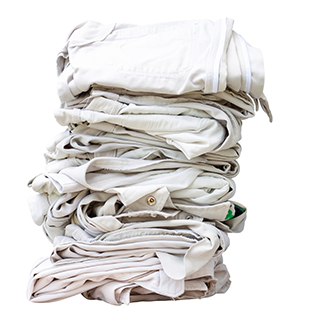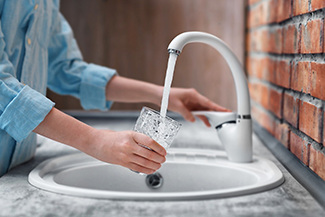Would My Home Benefit from a Water Treatment System?
Is a Water Treatment System worth it? Do I really need it?
Have you heard about the benefits of a water treatment system and wondered if it is something your home would benefit from? Water treatment comes in two forms: water softening and water filtration. Water softening removes the hard water component of our water while water filtration removes impurities and contaminants from your water used for cooking and drinking. Here are some things to help determine if you would benefit from a water softener or water filtration at your home.
6 Effects Of Hard Water On Your Home
1 | Mineral build up on faucets and fixtures

Do your plumbing fixtures have a coating of hard white junk that is hard to remove? Hard water, water that is high in particulates of calcium and magnesium, leaves behind a residue when it dries. If it is not removed it will continue to build up and can even prohibit faucets from turning all the way on or off slowing water flow. Hard water also makes it difficult to get a good shine on all hard surfaces like windows, floors and countertops.
2 | Laundry that is greying and stiff
Hard water adds wear to clothing and fabric as well as dulls the colors and greys the whites. Hard water will also make your washing machine work harder.
3 | Dishes come out murky
That murky look on your dishes, especially your glasses, comes from the mineral deposits left on dishes after the rinse cycle has run and the dishes are dry. In addition, hardwater can plug up the wash arms keeping them from providing the amount of water needed to clean well.
4 | Water heater lasts less than 10 years
The buildup of hard water deposits in the bottom of your hot water heater can shorten its life.
5 | Hair and skin are dry
The feeling that your skin is extra dry and your hair extra frizzy can be accentuated with hard water.
6 | Misting Systems have begun to spit instead of spray
The nozzles of any misting system clog with mineral deposits over time, causing them to have trouble delivering as even spray. When the nozzles become plugged, they will need to be cleaned or replaced.
Consider A Water Softener To Solve Hard Water Issues
The installation of a water softener that removes the minerals and particles of hard water, through a process called ion exchange, will solve these issues and free up a lot of need for expensive repairs to your home plumbing.
Without the mineral build up:
- Faucets and fixtures are much easier to keep clean and will look newer, longer.
- The dishwasher and washing machine will do their jobs better and actually require less detergent.
- Appliances will last longer.
- Water heaters will last longer and deliver clean, softened water to your shower.
- Misting systems will function better with softened water and without the mineral build up. The misting spray will not leave a white coating on nearby surfaces.
- Hair will have a silky-smooth feel and skin will not require as much lotion, if any!
What About Unappealing Drinking Water?
 Does your water have 'floaties' or have an off taste? If for whatever reason your own water tap is not your go to for a glass of water, using a reverse osmosis system will give you the clear, pure water you are looking for. Most importantly, these systems remove potentially harmful contaminants from your water supply, including chlorine, trihalomethanes (TTHMs), chloroform, pesticides, sediment, organic materials, and other contaminants. This can help ease or eliminate health concerns related to these contaminants. Imagine having pure, clean water and ice in your own kitchen- no disposable water bottles needed!
Does your water have 'floaties' or have an off taste? If for whatever reason your own water tap is not your go to for a glass of water, using a reverse osmosis system will give you the clear, pure water you are looking for. Most importantly, these systems remove potentially harmful contaminants from your water supply, including chlorine, trihalomethanes (TTHMs), chloroform, pesticides, sediment, organic materials, and other contaminants. This can help ease or eliminate health concerns related to these contaminants. Imagine having pure, clean water and ice in your own kitchen- no disposable water bottles needed!
Questions To Ask When Choosing A Water Treatment System
It's hard to believe that something as simple as H2O has become such a complicated topic. There is a lot of misinformation out there, so it is important to do your homework.
Be sure to vet the water treatment company before setting an appointment!
- Are they licensed, bonded and insured?
- Registered with the AZROC
- How long have they been in business?
- What is their reputation for service? Ask for referrals.
- Is the company registered at the Arizona Water Quality Association (AWQA)? Members are held to the industry's high code of ethics and ongoing education assuring you, the customer, that the company is committed to a high standard.
Don't be afraid to investigate the Product!
Ask lots of questions! Make sure you understand the different water treatment products and what they can and can't do.
Make sure you know exactly how the product works and what the products are rated for and understand the maintenance requirements.
Make sure the product you purchase is certified by the Water Quality Association (WQA). They have a consumer-friendly site that is a great resource for learning about water treatment. It also contains a list of independently tested and qualified water treatment products and verifies what each product is capable of. The WQA Gold Seal of Approval is earned by those products that qualify. You will want a product with this seal!
Home Maintenance Calendar To Do: #WaterTreatment
###
Photo Credits:
- Shutterstock
RELATED CONTENT:
- AZWQA: Water Softener Sustainability Professional | Arizona
- Arizona Water Quality Association: AZWQA.org
- Environmental Working Group’s What’s In Your Water Program
- Blog: Water Treatment Softening Myths
- Blog: Water Treatment From A One-Time Skeptic
- DIY Q&A: Rosie's Water Treatment Consumer Guide
- DIY Q&A: Clean Water For Your Home
- Podcast: Plumbing Maintenance, Water Saving And Gas Fitting Appliances
- Podcast: Earthships & Water Treatment
